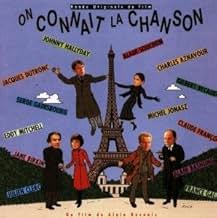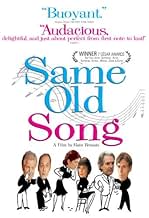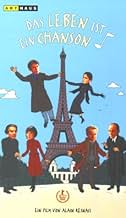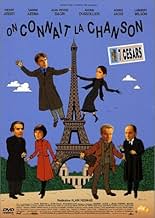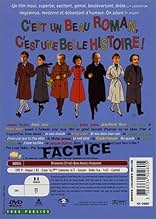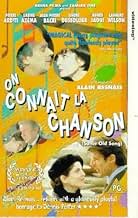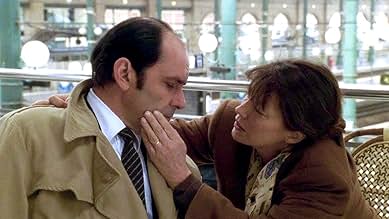On connaît la chanson
IMDb RATING
7.3/10
4.6K
YOUR RATING
A musical story about how people find their love on the streets of beautiful Paris.A musical story about how people find their love on the streets of beautiful Paris.A musical story about how people find their love on the streets of beautiful Paris.
- Director
- Writers
- Stars
- Awards
- 10 wins & 9 nominations total
- Director
- Writers
- All cast & crew
- Production, box office & more at IMDbPro
Featured reviews
I will always go out of my way - in December last year I tracked down a tiny theatre - capacity roughly 50 - in a Parisian alley to catch a performance of their 'Un air de famille' (yes, it was great, thanks for asking) to see anything written by Jean-Pierre Bacri and Agnes Jouai, and if they are performing as well, as they do in this movie, then that is icing on the cake. I tend to associate Resnais with pretentious intellectual 'popcorn' movies like Last Year At Marienbad and Hiroshima, Mon Amour so it makes a welcome change to discover that he can turn his hand to mainstream and deliver, with a little help from a great script and great acting from Bacri and Jouai, a great feel-good movie. The usual suspects - Andre Dussolier, Pierre Arditi, etc are on hand and turn in the usual above par performances. This is one to savor. 8/10
6gans
The sing-along idea is clever and well-implemented, but the story goes around in circles and above all the film is too static to support the musical premise. It's sad to see such lackluster direction from the creator of _Hiroshima mon amour_. If you like Jaoui and Bacri, go see _Le gout des autres_!
"On connait la chanson" is a great French movie. Not often the culture and lifestyle of a country is shown so happily, modern and still entertainingly in a film. The plot is not "straight", it's rather a patchwork of single stories, that are connected with each other. The French chanson, the title says it, plays a central role. It is this kind of music, though sometimes pretty close to kitsch, that is so typical for France. Instead of expressing their feelings only in words, the protagonists sing lines from well-known chansons, all the way from Maurice Chevalier to Serge Gainsbourgh.
Fortunately, there is no dubbed version of this film, the subtitles do very well. So if you want to know something about France and especially Paris today, go and watch it. Also people who normally don't like foreign films will have a lot of fun with it.
Fortunately, there is no dubbed version of this film, the subtitles do very well. So if you want to know something about France and especially Paris today, go and watch it. Also people who normally don't like foreign films will have a lot of fun with it.
Reminiscent of Jacques Demy's 1968 "The Young Girls of Rochefort" where characters now and then burst into song (and dance) to convey the story, and Eric Rohmer's flavor of intertwined relationships and coincidental meetings of characters that wrap around a tale, Alain Resnais' treatment here in 1997 "Same Old Song" has his characters burst into lines of songs in between dialogs. Irrespective of the mix and match of a male vocal coming out of a female character or vice versa, they are excerpted strains and words chosen from certain songs that propel the storytelling. It's as if the characters are thinking aloud in songs on the situation or predicament at hand. It is rather fun once you get a sense of what Resnais was trying to deliver. Being an Alain Resnais film, intellectual exchanges and philosophical tones are never lacking.
Definitely reminded me of his treatment on 1980 "Mon oncle d'Amerique" where he has scientific mice experiment scenes juxtaposed against the human (brain) reactions to relationships and love. In this 1997 "On connait la chanson", his fascination with how people think - how the brain cells work in each of the characters, is again deftly demonstrated. At the last segment, where a theoretical explosion of the minds occur as gray matters collide - there was an appearance of a graphical ear-shape (in quiet wavy motion) in the center of it all - it's amazing to see how Resnais' mind at 75 was still so very much into studying and unraveling human emotions, offering us life lessons in love.
The story centers around two sisters, Camille the tour guide who's also writing a thesis (Agnes Jaoui) and her popular and successful sibling Odile (Sobine Azema), and four men in their lives: an old flame of Odile - Nicolas (Jean-Pierre Bacri), husband of Odile - Claude (Pierre Arditi), writer of radio plays and quiet admirer of Camille - Simon (Andre Dussollier, more casually groomed than usual), and profiteering real-estate agent of Odile, fanciful beau of Camille and arrogant boss of Simon - Marc (Lambert Wilson).
Typographically oriented, I can't help noticing the sequence of treatment to the credit roll at the end of the film: it started with a centrifugal look of the names of les chanteurs, followed by horizontal scroll from right to left of the main cast and crew, then a quick shooting upwards to facilitate the conventional bottom to top scroll of rest of the credits.
It may not be a French film for just anybody, it certainly is delightful to experience. (An Artistic License and Merchant-Ivory Films production indeed!) The subtitles, translated by Ian Burley, were super: the lyrics actually rhyme in English, e.g., "resist", "exist", "egotist"!
This film was dedicated to Dennis Potter, a cerebral genius he was. Check out his 1996 "Karaoke" (a multitude of colorfully complex characters) and "Cold Lazarus" (quite a sci-fi notion not completely implausible) - both centers around Albert Finney being the main character, and as always, a tour de force performance Finney delivered.
Definitely reminded me of his treatment on 1980 "Mon oncle d'Amerique" where he has scientific mice experiment scenes juxtaposed against the human (brain) reactions to relationships and love. In this 1997 "On connait la chanson", his fascination with how people think - how the brain cells work in each of the characters, is again deftly demonstrated. At the last segment, where a theoretical explosion of the minds occur as gray matters collide - there was an appearance of a graphical ear-shape (in quiet wavy motion) in the center of it all - it's amazing to see how Resnais' mind at 75 was still so very much into studying and unraveling human emotions, offering us life lessons in love.
The story centers around two sisters, Camille the tour guide who's also writing a thesis (Agnes Jaoui) and her popular and successful sibling Odile (Sobine Azema), and four men in their lives: an old flame of Odile - Nicolas (Jean-Pierre Bacri), husband of Odile - Claude (Pierre Arditi), writer of radio plays and quiet admirer of Camille - Simon (Andre Dussollier, more casually groomed than usual), and profiteering real-estate agent of Odile, fanciful beau of Camille and arrogant boss of Simon - Marc (Lambert Wilson).
Typographically oriented, I can't help noticing the sequence of treatment to the credit roll at the end of the film: it started with a centrifugal look of the names of les chanteurs, followed by horizontal scroll from right to left of the main cast and crew, then a quick shooting upwards to facilitate the conventional bottom to top scroll of rest of the credits.
It may not be a French film for just anybody, it certainly is delightful to experience. (An Artistic License and Merchant-Ivory Films production indeed!) The subtitles, translated by Ian Burley, were super: the lyrics actually rhyme in English, e.g., "resist", "exist", "egotist"!
This film was dedicated to Dennis Potter, a cerebral genius he was. Check out his 1996 "Karaoke" (a multitude of colorfully complex characters) and "Cold Lazarus" (quite a sci-fi notion not completely implausible) - both centers around Albert Finney being the main character, and as always, a tour de force performance Finney delivered.
In the unapproximate center of "On connaît la chanson," find a marvelous joke that missed by everyone at the sold out SFIFF screening I attended. If you want to try to catch it yourself, then don't read on! I'm writing to those of you who didn't or won't catch it. Four or five characters are seated chatting or arguing, I forget, round a table in a busy restaurant. As you know from other comments here, the script incorporates line fragments from well-known French songs (kind of like those "hidden picture" puzzles in the dentist office magazine). As each occurs, someone bursts into song. One of our group, after an unremarkable, perfectly conversational pause, says "je ne regret rien," then pauses, as does everyone else round the table. They look at one another, everyone at everyone, the very clatter of the restaurant seems to pause, waiting, and for the only time in this film, nobody takes the cue. Nobody breaks into the Piaf standard.
Did you know
- TriviaThe film is dedicated to the memory of Dennis Potter, and is in the style of Potter's lip-sync musicals like Pennies from Heaven (1978), The Singing Detective (1986) and Lipstick on Your Collar (1993).
- ConnectionsFeatured in 6 à la maison: Episode dated 27 January 2021 (2021)
- SoundtracksJ'ai Deux Amours
Music by Vincent Scotto
Lyrics by Georges Koger and Henri Varna
Performed by Josephine Baker
- How long is Same Old Song?Powered by Alexa
Details
- Release date
- Countries of origin
- Official site
- Languages
- Also known as
- Same Old Song
- Filming locations
- Hôtel Meurice - 228 Rue de Rivoli, Paris 1, Paris, France(opening scene: Camille tells about von Choltitz in front of the hotel)
- Production companies
- See more company credits at IMDbPro
Box office
- Budget
- €7,900,000 (estimated)
- Runtime2 hours
- Color
- Sound mix
- Aspect ratio
- 1.85 : 1
Contribute to this page
Suggest an edit or add missing content


